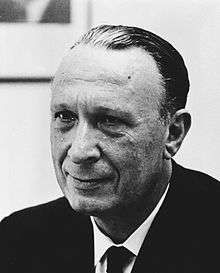Aharon Katzir
| Aharon Katzir | |
|---|---|
 | |
| Native name | אהרן קציר |
| Born |
Aharon Katchalsky September 15, 1914 Łódź, Poland |
| Died |
May 30, 1972 (aged 57) Ben Gurion International Airport in Central District, Israel |
| Citizenship | Israeli |
| Occupation | Pioneer in the study of the electrochemistry of biopolymers |
| Known for | Killed in the 1972 Lod Airport Massacre |
| Awards |
|
Aharon Katzir (Aharon Katzir-Katchalsky) (September 15, 1914 – May 30, 1972)[1] was an Israeli pioneer in the study of the electrochemistry of biopolymers. He was killed in the Lod Airport massacre in 1972.
Biography
Born 1914 in Łódź, Poland, he moved to Palestine in 1925, where he taught at the Hebrew University in Jerusalem. There, he adopted his Hebrew surname Katzir.
He was murdered in a terrorist attack at Ben Gurion International Airport in 1972 in which 26 people were killed and 80 injured.[2] His younger brother, Ephraim Katzir, became the President of Israel in 1973.
Awards and commemoration
- In 1961, Katzir was awarded the Israel Prize, in life sciences, together with his pupil, Ora Kedem.[3]
- The State of Israel issued a postage stamp in memory of Katzir.
- The Katchalsky crater on the Moon is named after him.
- A series of Hebrew lectures is held at Tel Aviv University in memory of Katzir, organized by his son Avrahm, a professor of physics. It is named: In the Crucible of the Revolution (BeKur HaMahapecha), alluding to a popular book Katzir wrote about scientific progress. It has featured lectures by Nobel Prize laureates Daniel Kahneman and Aaron Ciechanover, and renowned philosopher Hilary Putnam.[4]
- A center at the Weizmann Institute of Science is named after Katzir.[5]
- A scholarship program of the Israeli Ministry of Defense is also named after him.
See also
References
- ↑ "Weizmann Institute of Science Archives".
- ↑ Lod Airport Massacre
- ↑ "Israel Prize recipients in 1961 (in Hebrew)". cms.education.gov.il (Israel Prize official website). Archived from the original on April 11, 2010.
- ↑ BeKur HaMahapecha Lectures
- ↑ Aharon Katzir-Katchalsky Center
This article is issued from Wikipedia - version of the 11/13/2016. The text is available under the Creative Commons Attribution/Share Alike but additional terms may apply for the media files.